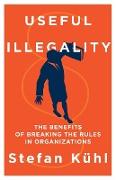- Start
- Useful Illegality
Useful Illegality
Angebote / Angebote:
Organizations face a dilemma. On the one hand, they have to ensure the effectiveness of their official policy, but on the other hand, they count on their members to frequently deviate from the rules and ignore instructions for the sake of the organization. This is because formal rules are often too rigid to fit every situation, so organizations must be willing to tolerate deviance-as long as it does not fundamentally call the existence of the formal order into question. In organizational research, rule deviance that is functional for an organization is known as useful illegality. The concept pertains not only to behavior that breaches state laws, but also to behavior that violates an organization's formal expectations, meaning the laws of the organization. Disregarding occupational safety laws, exceeding state-mandated rest periods for truck drivers or bribing customers to win a contract can all be considered cases of useful illegality, as can ignoring official channels or flouting internal procedural guidelines-incidents that violate the formal expectations in an organization but do not break state laws. For all of the outrage usually generated by rule-breaking and legal violations, it is widely acknowledged that rule deviance is functional in organizations. It is not for nothing that "working to rule" is considered the most effective form of industrial action for paralyzing an organization. When all rules and instructions are followed to the letter, even a well-planned organization will come to a standstill. The organization is broken by the rigidity of its formal structures and done in by its mania for order and ordinances, its regulation frenzy and its rule fetishism. But this insight is quickly forgotten when a media scandal erupts around an organization that has broken a rule or law.
Folgt in ca. 10 Arbeitstagen
